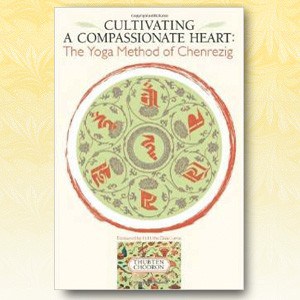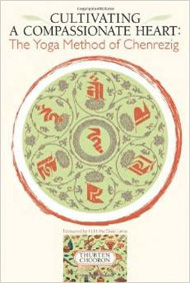The root of all happiness
Preface to Cultivating a Compassionate Heart


Buy from More on this book… or Amazon
Chenrezig is the embodiment of all of the Buddhas’ compassion. The main function of this deity called Chenrezig is to develop compassion in the hearts of oneself and all sentient beings. Compassion is the mind that cares for others, whether they help you, harm you, or are indifferent. Why is it so important for us sentient beings to generate compassion in our hearts? Without compassion, this world would be a billion times worse than it is now. With compassion, there will be less war, famine, disease, torture, and natural disasters, all of which come from karma.
Your mind creates karma. It all depends on you and how you think. The correct way of thinking transforms activities into virtue, and the result of these activities is only happiness. Thinking in a mistaken way leads to engaging in nonvirtuous actions, which result only in suffering. Living daily life with compassion for others is the purest attitude, and thus your actions become the best virtue. These actions result in happiness and success now and in future lives, as well as freedom from the oceans of samsaric suffering. These results include all that one wishes for: a good rebirth and the peerless happiness of enlightenment. If you live with an open heart, not closed tight with self-cherishing, your life is filled with positive things and joy. You do not have much regret now and even less at the time of death. You rejoice at goodness, and you will benefit others in this world, including animals. There are no barriers between you and others, and you feel everyone is connected and kind to you—others become precious to you, like family. When you feel and act like that, others will feel the same way about you—you will be dear to them, like family. They will care for you, love, support, and share with you, and your heart and life will be filled with light. By living with a good heart each day, you can say goodbye to depression as well as to the selfish mind from which depression comes.
Compassion brings peace in the world, in your country, and in your family. It brings harmony and peace between children and parents and couples. With compassion, all of your wishes for happiness will be fulfilled. Why? Because with compassion you help others be free from difficulties. As a result of the benefit you bring to others—freeing them from problems, others will help you fulfill your wishes. You will receive support from others dependent on your helping them; scientifically this is the nature of cause and effect. All this depends on us, no matter whether we are a Buddhist or a nonbeliever.
The opposite of compassion—the self-cherishing thought that renounces others’ welfare and doesn’t care about them—harms others. It leads you to harm so many sentient beings with your body, speech, and mind. From these actions (causes), you receive the effect—others harm you. Instead of happiness you continuously experience misery and problems. If we look at our lives and examine our experiences, we can see this very clearly. We can understand how a happy life and a suffering life are dependent on causes and conditions created by that individual. Think about this even if you are a nonbeliever and do not want to follow any religion. If you want happiness, practicing the good heart is essential.
Thus compassion is the root of all of happiness—the peerless happiness of enlightenment, the peace of being free from samsara, and the happiness of this life that we experience moment to moment. Without compassion, your life is filled with unending problems. Therefore compassion is the root of your own and all other living beings’ happiness. So many sentient beings will be happy in this life by your being compassionate; your compassion also enables numberless other sentient beings to be happy in future lives, to attain freedom from samsara, and to become fully enlightened Buddhas.
Whether others practice compassion towards you or not, if you don’t practice the good heart, you may harm other sentient beings throughout your life. One individual without compassion can make many millions of people suffer. That person can destroy the world, if not in this life, maybe in another life. Therefore practicing compassion is the most important meditation, the most important practice, and the best way to lead your life. For everyone—a leader of a country, a business person, a farmer, an actor, an enlisted man or woman, a worker, a married person, an ordained person, a doctor, a nurse, or a prostitute—compassion is the best way to live the life.
To develop compassion, prayers are not sufficient. Extensive intellectual understanding of philosophy is not enough. One needs to meditate. Yet even that is not enough. One needs to receive the special blessing of the Deity of Compassion, Chenrezig. Thus one needs to meditate on Chenrezig and recite the mantra of the Deity of Compassion, om mani padme hum. Om mani padme hum is the mantra cherished by all the Buddhas. By reciting this mantra you will be able to fulfill the wishes of all sentient beings. This mantra may be recited by anyone wishing for happiness, even the animals, mosquitoes, spiders, lobsters, and ants need to recite it, if they could!
The author of this meditation book, Venerable Thubten Chodron, has been a Dharma student since 1975. She was ordained as a sramanerika (getsulma) in 1977 and as a bhikshuni (gelongma) in 1986, and she has been teaching in different parts of the world for many years, awakening many sentient beings, giving light in their lives, saving them from the causes of suffering, and causing them to attain not only temporal but ultimate happiness. Her attitude and activities fit well with the Compassionate-Eyed Buddha, as well as the meaning of the mantra om mani padme hum—sincerely wishing, without conditions, to abandon the causes of suffering and practice virtue, which is the cause of all happiness up to enlightenment; benefiting others in many different ways: liberating prisoners from the real prison of samsara, the continuation of which has no beginning; effortlessly leading retreats for other people; tirelessly giving inspiring Dharma talks; leading courses in many different countries; creating a place for practice; being a good example—an inspiration for women in the world, by giving herself to others with full confidence.
Thank you very much to Chenrezig, to Venerable Thubten Chodron, and to people who read this text.
Kyabje Lama Zopa Rinpoche
Kyabje Lama Zopa Rinpoche, one of Venerable Chodron's teachers, was born in Thami, Nepal, in 1946. At the age of three he was recognized as the reincarnation of Sherpa Nyingma yogi, Kunsang Yeshe, the Lawudo Lama. Rinpoche’s Thami home was not far from the Lawudo cave, in the Mount Everest region of Nepal, where his predecessor meditated for the last twenty years of his life. Rinpoche’s own description of his early years may be found in his book, The Door to Satisfaction (Wisdom Publications). At the age of ten, Rinpoche went to Tibet and studied and meditated at Domo Geshe Rinpoche’s monastery near Pagri, until the Chinese occupation of Tibet in 1959 forced him to forsake Tibet for the safety of Bhutan. Rinpoche then went to the Tibetan refugee camp at Buxa Duar, West Bengal, India, where he met Lama Yeshe, who became his closest teacher. The Lamas went to Nepal in 1967, and over the next few years built Kopan and Lawudo Monasteries. In 1971, Rinpoche gave the first of his famous annual lam-rim retreat courses, which continue at Kopan to this day. In 1974, with Lama Yeshe, Rinpoche began traveling the world to teach and establish centers of Dharma. When Lama Yeshe passed away in 1984, Rinpoche took over as spiritual director of the Foundation for the Preservation of the Mahayana Tradition (FPMT), which has continued to flourish under his peerless leadership. More details of Rinpoche’s life and work may be found on the FPMT web site. (Source: lamayeshe.com. Photo by Aikido.)

